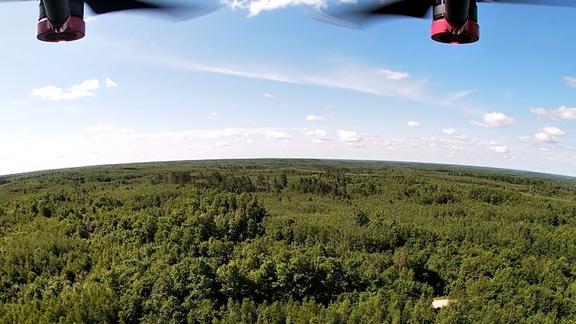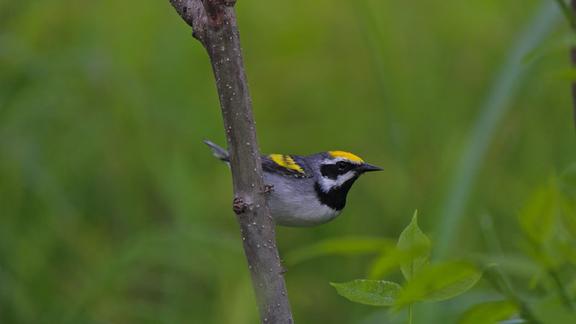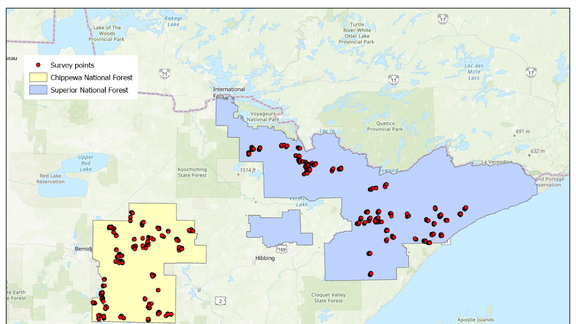Featured Research Labs
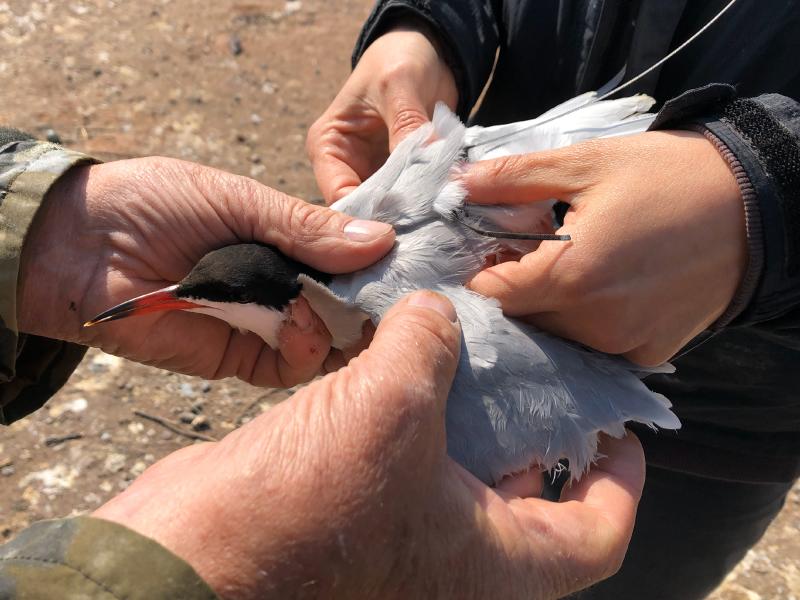
Program Overview
NRRI’s Applied Wildlife Ecology Research Program studies direct and indirect impacts of environmental change on wildlife, biodiversity, and ecosystem function. The researchers gather critical data on species of ecological, cultural, and economic importance in Minnesota and throughout the Western Great Lakes Region, including game species and species of concern.
Program Goals
Program goals are achieved by integrating data collected to understand behavior, ecology and status of wildlife species, populations, and communities.
- Identify and address current and emerging resource management problems to create solutions that balance economic, ecological, and recreational functions of our natural resources.
- Develop economically sustainable conservation strategies and land management guidelines to preserve and enhance wildlife diversity and protect species in greatest conservation need.
- Provide information, expertise, and guidance to resource managers to support resource management decisions.
Program Impact
Wildlife plays a significant role in maintaining ecosystem health, ecosystem services, and plant community stability and forest succession. Changes in wildlife populations and communities can signal larger changes in the ecosystems, providing an opportunity to learn more about the causes and consequences of the changes.
By evaluating the effects of human activities - including natural resource-based economic activity - on wildlife, this research finds solutions to maintain ecosystem function while supporting economic opportunities.
Expertise and Unique Strengths
Along with a 30-plus year track record of region - and state-specific expertise on birds and mammals, this program has an equally long history of performance, delivery and expertise on issues of state, regional and continental importance. Duluth, Minn., is also the epicenter of mid-continent bird migration.
Stakeholders and Partners
This program engages diverse stakeholders and partners, using established and novel approaches to address key research questions. Partnerships are critical for successful project delivery. Project outcomes are of broad public interest and value given the importance of wildlife conservation to many different user groups.
Recent Projects and Partners
Recent Projects and Partners
Recent Projects and Partners
Recent Partnerships & Research Examples
Forest Fishers Den Box Project to guide management of fishers (including habitat management) and bobcats; and to learn more about a species of cultural/tribal and ecological importance.
Partners include:
- Minnesota DNR
- 1854 Treaty Authority
- Leech Lake Band of Ojibwe
- Carlton County Land Department
- Cloquet Forestry Center
- Hubachek Wilderness Research Center
- UPM/Blandin
Wildlife-Mycorrhizal Fungi-Forest Health Project to better understand how to manage wildlife and habitats to enhance forest resilience via dispersal of mycorrhizal fungi.
Partners include:
- Wisconsin DNR
- Leech Lake Band of Ojibwe
- US Forest Service Northern Research Station
Marten Thermal Ecology and Climate Change Project: This is a deep evaluation of martens sensitivity to changing snow conditions, capacity for adaptation and opportunities for management to mitigate climate risks. This research is important to regional tribes for whom martens are culturally important as a clan animal.
Partners include:
- Grand Valley State University
- Little River Band of Ottawa Indians
- Minnesota DNR
- Polish Academy of Sciences/Mammal Research Institute.
Study of Carnivore Expansion to SE Minnesota: This project has high public interest and value due to: 1) the growing presence of these charismatic species where they have previously been absent for decades, 2) concern over effects on game species and pets, and 3) management considerations as DNR considers extending harvest to SE Minnesota.
Trail Cameras Study: A novel adoption of methods to manage and analyze high volumes of trail camera data. This holds potential for future opportunities in citizen-science projects using trail cameras.
Staff
Featured Research Projects
Related News
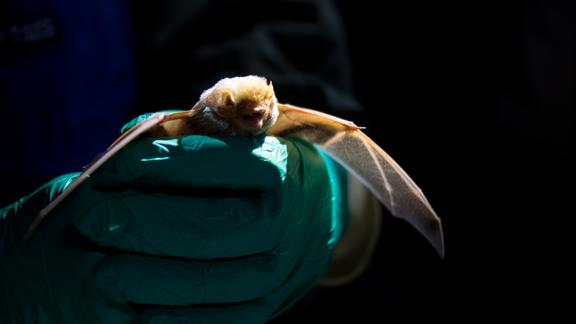
With white-nose syndrome decimating bat populations can human activities help them recover? NRRI Scientist Ron Moen has some ideas to research.
Media Coverage
- – Detailed accounts of 250 birds in Minnesota – Hometown Focus
- – How our extreme weather is impacting fish and wildlife in our region – WDIO
- – Talking Minnesota’s migratory birds with U of M – University of Minnesota News
- – Identifying Deer-Vehicle Collisions in Minnesota – Center for Transportation Studies
- – Birds and climate: it’s a complex relationship – Hometown Focus
- – Canada Lynx research in northeastern Minnesota continues, plans to expand – WTIP
- – Fisher research at NRRI – WDIO
- – Minnesota DNR: Don't veer during peak deer, moose season – WCCO News
- – Minnesota researchers explore how road design can reduce deer collisions – KSTP-TV
- – Talking deer collisions with U of M – University of Minnesota News
- – Birds, bugs and climate change – MPR News
- – Weiss: Old friends return — fisher, bobcat sightings on the rise – Rochester Post Bulletin
- – Connecticut Warbler and other songbird populations on the decline in Superior National Forest – WTIP
- – Fisher population continues to decline across Superior National Forest – WTIP
- – Minnesota researchers aim to reduce deer-vehicle collisions along Highway 61, other roadways – WTIP
- – Study sends fisher biologists back to the drawing board – The Timberjay
- – Northern Minnesota experiment attracted some fishers — and other critters, too – Duluth News Tribune
- – Why deer crossing signs have disappeared from Minnesota highways – Local Today
- – Do you enjoy bird watching? Researchers need your help this summer – KBJR News
- – Damming research: Study finds beavers might not be all bad for trout streams – Duluth News Tribune
- – Minnesota Researchers Will Count Dead Deer to Prevent Future Vehicle Collisions – Field & Stream
- – Minnesota drivers may hit 20 times the deer reported to state – Duluth News Tribune
- – Insect pests continue to threaten trees near Lake Superior, BWCA – WTIP North Shore Community Radio
- – Potential impacts of emerald ash borer on wildlife in black ash wetlands – University of Minnesota Research Brief
- – Study analyzes beavers as 'ecosystem engineers' near North Shore rivers – WTIP North Shore Community Radio
- – Study reveals woodcock wintering grounds – Duluth News Tribune
- – Beaver dams important to freshwater ecosystems – Red Wing Republican Eagle
- – New study demonstrates the value of beavers as ecosystem engineers – TBNewsWatch.com
- – Research finds beavers a critical component of Northland forests – Duluth News Tribune
- – Beavers support freshwater conservation and ecosystem stability – University of Minnesota Research Brief
- – Minnesota researchers to study how climate change affects flying squirrels – Grand Forks Herald
- – Wood turtles declining in Minnesota – Duluth News Tribune
- – Green Visions: "This is a warning signal from our world" – KUMD
- – Trail cams keep tabs on fisher denning boxes – Outdoor News







